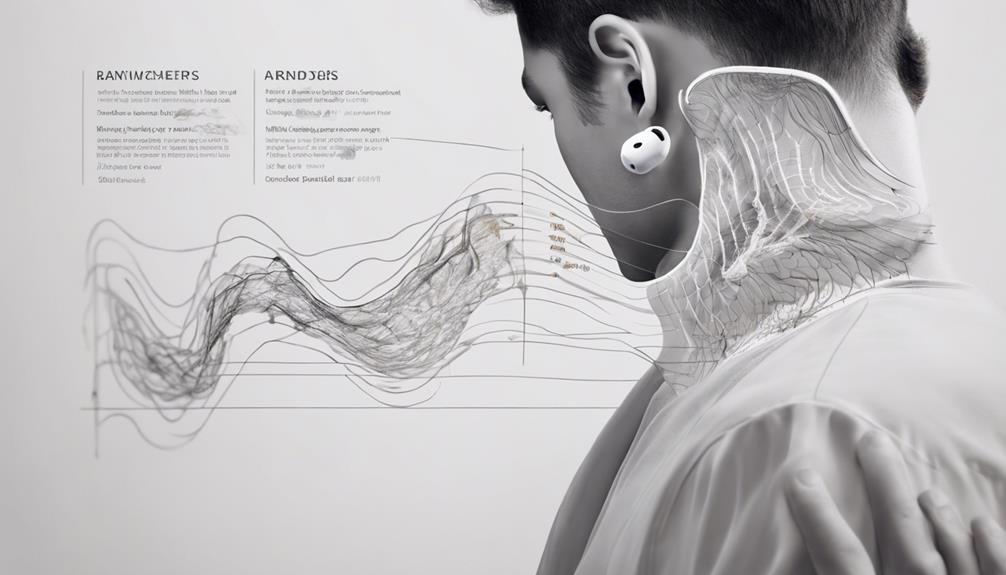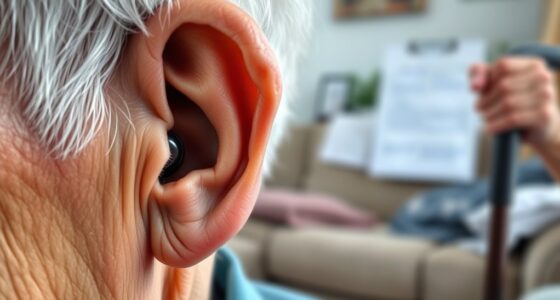When looking for the ICD code for hearing impairment in the left ear, we usually start with specific codes like H90.4, which indicates unilateral sensorineural hearing loss.
However, it's not just about finding a code; it's about ensuring accuracy and compliance with coding guidelines to avoid potential errors.
Understanding the nuances in coding for auditory issues can significantly impact patient care and reimbursement processes, making it essential to navigate this area with precision.
Key Takeaways
- Understand left ear hearing loss types for accurate ICD coding.
- Utilize ICD-10 codes with 'L' laterality for left ear specificity.
- Accurate coding aids in billing, treatment planning, and communication.
- Use resources to find precise ICD codes for left ear hearing loss.
Overview of ICD Codes for Hearing Loss
When diagnosing hearing loss, healthcare professionals rely on specific ICD codes to accurately categorize the type and laterality of the condition.
In the realm of audiology and speech-language pathology, understanding the nuances of ICD-10-CM codes is paramount. For sensorineural hearing loss affecting the left ear, the diagnosis code plays a crucial role in treatment planning and documentation.
Codes such as H90.4 specifically denote unilateral sensorineural hearing loss in the left ear. This distinction is vital for healthcare providers to precisely pinpoint the affected ear and tailor interventions accordingly.
Proper coding not only ensures accurate medical records but also aids in effective communication among professionals involved in the patient's care. By utilizing the appropriate ICD-10-CM codes for left ear hearing loss, healthcare teams can streamline the diagnosis process, improve treatment outcomes, and facilitate billing procedures with clarity and precision.
Understanding Left Ear Hearing Loss ICD Codes

As we shift our focus to the realm of ICD codes for left ear hearing loss, it becomes crucial to understand the specific codes that denote the type and laterality of the condition.
For bilateral sensorineural hearing loss in the left ear, the appropriate ICD-10 code is H90.5.
In cases of unilateral sensorineural hearing loss specifically in the left ear, the corresponding code is H90.4.
If the hearing loss in the left ear is conductive and unilateral, the correct code to use is H90.1.
On the other hand, when the type of hearing loss in the left ear is unspecified, the code H90.6 should be utilized.
Properly assigning these ICD codes for left ear hearing loss is essential not only for accurate medical billing but also for effective treatment planning. Understanding and utilizing these codes correctly ensures that healthcare providers can accurately document and communicate the specifics of the patient's condition for appropriate coding and billing purposes.
Steps to Identify the Correct ICD Code

To correctly identify the appropriate ICD code for left ear hearing loss, one must determine the type and severity of the hearing impairment through audiometry tests and medical documentation. Conductive hearing loss affects the outer or middle ear, while sensorineural hearing loss involves the inner ear or auditory nerve.
By conducting a thorough examination of the ears and performing hearing screenings, healthcare providers can pinpoint whether the hearing loss is conductive, sensorineural, or a mix of both in the left ear. Once the type and severity are established, it's crucial to look up the specific ICD-10 code that corresponds to left-sided sensorineural or conductive hearing loss.
Proper sequencing of the primary diagnosis related to the left ear hearing loss is essential for accurate coding. If there's uncertainty about the appropriate ICD code, consulting with a healthcare professional or coder can provide guidance to ensure precise coding and billing.
Billing and Documentation Considerations

In billing and documentation considerations for left ear hearing loss, accurate utilization of the ICD-10 code with the appropriate laterality indicator 'L' is crucial for specifying the affected side. When documenting hearing loss in the left ear, it's essential to follow specific guidelines to ensure proper billing and documentation.
Here are some key points to consider:
- Use the correct ICD-10 code: Select the appropriate code that not only indicates left ear involvement but also specifies the type of hearing loss (conductive, sensorineural, or mixed).
- Include the laterality indicator: Adding the 'L' laterality indicator to the ICD-10 code is vital for distinguishing left ear issues from right ear or bilateral conditions.
- Ensure thorough documentation: Detailed and accurate documentation of left ear hearing loss supports proper billing, insurance processing, and monitoring of the patient's condition and treatment progress.
Resources for ICD Code Lookup

Exploring various online medical coding resources can streamline the process of finding the correct ICD code for left ear hearing loss. When looking up codes for conditions related to the inner ear, it's crucial to differentiate between conductive and sensorineural hearing loss in the left ear.
Websites like the Centers for Medicare & Medicaid Services (CMS) or the World Health Organization (WHO) provide databases where specific codes such as H91.11 (Sudden idiopathic hearing loss, left ear) can be easily accessed for detailed documentation. These resources often offer search functionalities that allow users to input keywords like 'left ear' or 'hearing loss' to find the most relevant codes quickly.
Additionally, when documenting hearing loss, it's essential to check for laterality-specific codes to ensure accuracy in coding practices. By utilizing these resources effectively, healthcare professionals can efficiently find and apply the correct ICD codes for left ear hearing loss, supporting accurate billing and patient care.
Frequently Asked Questions
What Is the ICD-10 Code for Hearing Loss Unspecified?
We often encounter questions about ICD-10 codes for hearing loss unspecified. It's crucial to ensure accuracy in coding to reflect the specific side and type of hearing loss.
Using codes like H91.92 when detailed information is lacking helps in billing and tracking. Healthcare providers rely on such codes when documenting hearing loss without further specification.
Our focus is on providing precise coding for accurate diagnosis and treatment.
What Is the ICD-10 Code for Sudden Hearing Loss?
We know the ICD-10 code for sudden hearing loss in the left ear is H91.22. This code helps accurately document and bill for this condition.
Sudden hearing loss can be caused by various factors and needs proper classification for effective treatment. Using the specific code H91.22 ensures the medical team can address the issue promptly.
Accurate coding is crucial for tracking patient conditions and providing the best care possible.
What Is the ICD-10 Code for Hearing Loss in the Left Ear?
We ensure accuracy and clarity by using the correct ICD-10 code for hearing loss in the left ear, which is H90.41.
This code specifies unilateral sensorineural hearing loss affecting the left ear. Accurate documentation of the affected side aids in proper billing and treatment.
What Is the ICD-10 Code for Left Ear Sound?
We can identify the ICD-10 code for left ear sound by referencing the alphanumeric sequence that designates the affected side. In this case, 'L' is used to specify the left ear.
For example, the code for left-sided sensorineural hearing loss is H90.3-L. This notation is crucial for pinpointing the side of the ear affected and guiding appropriate diagnosis and treatment.
Accurate coding ensures effective management of left ear sound-related issues.
Conclusion
In the intricate symphony of medical coding, the precise selection of the correct ICD code for hearing loss in the left ear is crucial.
Like a skilled conductor orchestrating a complex piece of music, attention to detail and accuracy is key in ensuring proper billing and treatment planning.
By following the guidelines and utilizing resources available, healthcare providers can harmoniously navigate the world of auditory health coding with finesse and expertise.










